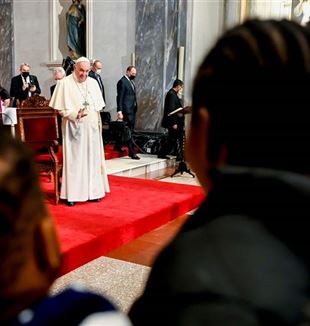
The Pope in Cyprus: “Erecting barriers is never the solution”
The Pope in Nicosia, visiting the island that has been divided in half for 50 years. "The Spirit invites us not to resign ourselves to the divisions of the past and to cultivate together the field of the Kingdom, patiently, assiduously and concretely.”"May this island, marked by a painful division – from here I can see that wall – become by God’s grace a workshop of fraternity. When people ask “Who are you?”, you can readily respond, ‘Look, I am your brother, your sister’.” This is not a rhetorical wish, but a dream that is achievable by a patient journey, made up of small daily steps, as Pope Francis expressed in the concluding speech of his brief and intense visit to Cyprus. "The dramatic stories you have told me have had a positive ending, but we cannot forget your many brothers and sisters who did not make it," the Pope said to the young migrants listening to him in the Church of the Holy Cross in Nicosia, just a few meters away from the barbed wire that has divided the island in half for almost 50 years. This is the last buffer zone of the European territory controlled by the United Nations, which is increasingly crossed illegally by migrants, to the benefit of Turkish traffickers.
"I have seen the barbed wire near here,” the Pope added in his own words, “we are scandalized when we hear the story of the lagers of the last century, how come it happened?, we ask ourselves. But this is happening today on our shores. It is my responsibility to open our eyes. One cannot remain silent." The 50 refugees, who will be transferred from Cyprus to Italy at the expense of the Vatican, are a concrete sign of the need for controlled paths of integration, and of the symbolic gesture towards the island that has the highest percentage – in proportion - of asylum seekers in the European Union.
"History teaches us that erecting barriers is never the solution, because barriers represent fear, erase any promise of the future and highlight our lack of vision. It is this vision that is badly needed,” says the Patriarch of Jerusalem, Pierbattista Pizzaballa, welcoming the Pope. He is the pastor of the small community of Cyprus, a strip of the Holy Land. It was to here that St. Barnabas, the first missionary alongside St. Paul, came. The patient apostolic ardor of Joseph the Levite, who converted to Christianity in Jerusalem, was the common thread that marks the steps and words of Pope Francis. The Orthodox monastery that holds the tomb of St. Barnabas in Salamis is a battered museum located the territory occupied by Turkey in 1974. The elderly Archbishop Chrysostomos recalled the wounds inflicted by the Turkish army on Cypriot holy sites and artistic heritage. The leader of the Orthodox community, the largest in Cyprus, spoke of Turkey's plan of ethnic cleansing, through the barbaric expulsion of 200,000 Christian inhabitants, the confiscation of churches, the spoliation of the property of priests. The Orthodox Primate asked the Pope for active support, underlining the excellent relations between the Churches. These words are supported by the many facts that speak of real ecumenism in Cyprus, from the Orthodox churches in which Catholics can celebrate Mass to collaboration in responding to the needs of the poorest. "By placing everything he had at the feet of the Apostles, Barnabas entered their hearts. We are also invited by the Lord, to rediscover ourselves part of the same Body, to lower ourselves at the feet of our brothers,” said the Pope as he met with the members of the Cypriot Holy Synod. "History has opened wide furrows between us in the field of our relations, but the Holy Spirit wants us to come together with humility and respect. He invites us not to resign ourselves to the divisions of the past and to cultivate together the field of the Kingdom, patiently, assiduously and concretely.”
Vassillios, Metropolitan of Constantine and Famagusta and a protagonist of the dialogue with Rome, is convinced of this: “When I was a young student in Switzerland, a Catholic priest allowed me to celebrate in his parish," he said, "I always think of him with gratitude. That is why when the Latin Vicar of Cyprus asked me about the availability of a church for a small Catholic community in my diocese, composed of Filipinos, I immediately said yes." This is not a strange request in Cyprus, where 85 percent of Catholics were not born on the island. Thus many are Asian, mostly Filipino. This was evident looking at the stands of the stadium in Nicosia, where the Pope celebrated Mass. 10 thousand faithful were present, a record number for the Cypriot Church. Francis encouraged everyone to be luminous Christians, capable of turning on lights of hope in the darkness of suffering and aridity.
Read also - Pope Francis' speeches and homilies in Cyprus
Before saying goodbye to that unique mosaic of faces, rites and traditions, the Pope confided that these days had been good for him; they have allowed him to breathe the atmosphere of the Holy Land, where antiquity and the variety of Christian traditions enrich the pilgrim, and to meet communities of believers who live the present with hope, open to the future, and share this horizon with those most in need.